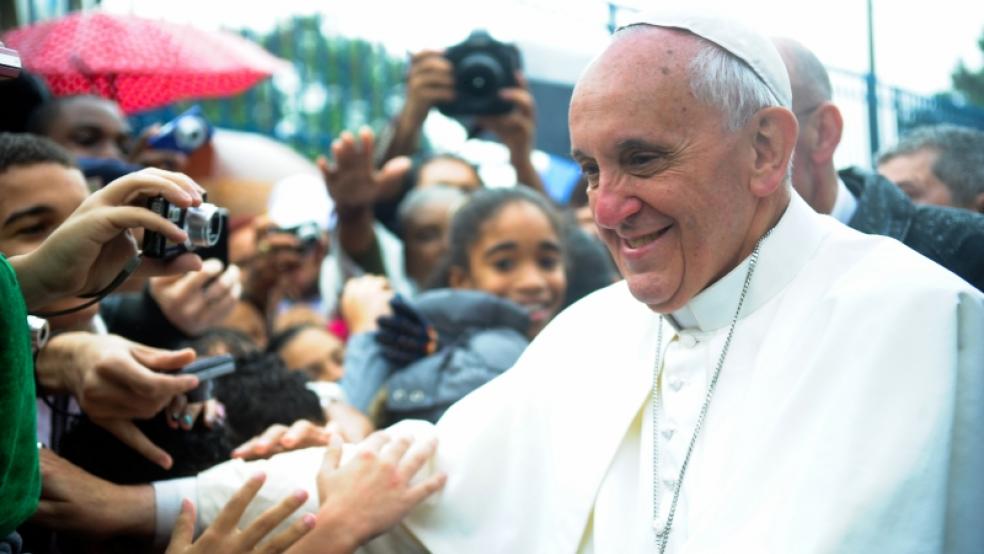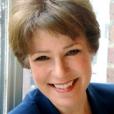Before the smoke turned white at the Vatican on March 13, 2013, people who knew Cardinal Jorge Mario Bergoglio, the Archbishop of Buenos Aires, believed he would fundamentally change the Vatican and inspire the 1.2 billion Catholics in the world if he was ‘the one.’
The 78-year old Archbishop and Cardinal Bergoglio won the papal crown, and with the energy of a 20-something, he showed the world immediately that he would not be Vaticanized. He was a man of a people who felt more comfortable in a plain muslin robe than a bejeweled vestment.
SLIDESHOW: Before He Was Pope--Francis' Life in Pictures
Bergoglio took the name Francis as his papal name, after St. Francis of Assisi. He was inspired by St. Francis because of that saint’s devotion and sacrifice for the poor. St. Francis was also concerned about the environment, although global warming wasn’t an issue at the turn of the 13th century.
It hasn’t taken long for Pope Francis to redefine the role of Pope and remind Catholics and the faithful of all religions about what our obligations as human beings are to one another.
His passion may be the result of growing up in Argentina, the son of an Italian immigrant who fled his homeland because of fascism. Here are TK surprising facts about Pope Francis.
Pope Francis’s Surprising Early Life
- Bergoglio worked as a bar bouncer, a janitor sweeping floors and a chemical tester in a laboratory before he joined the Jesuits.
- He loves soccer and is a fan of the San Lorenzo de Almagro football club in Argentina.
- He likes the Tango and a related musical genre called Milonga, which was popular in the 1870s.
- At age 22, he entered the seminary. But he almost quit because he had fallen for a girl and was thinking about foregoing the celibate life.
- He tried to learn English while studying the language in Ireland, but it didn’t take.
- Over the next 30 years, he rose to the position of auxiliary bishop of Buenos Aires and eventually became archbishop. That’s when he earned the moniker “slum bishop” because he increased the number of priests assigned to the poorest areas of the city.
- The Pope’s plane is called “Shepherd One.”
Related: Pope Radically Simplifies Catholic Marriage Annulment Procedures
- Francis has been on the covers of Time, Rolling Stone, Esquire and The Advocate. Fortune ranked him number one in their list of great leaders in 2014, and Forbes listed him as the fourth most powerful person in the world that same year.
On Fiscal Issues
- As archbishop, Bergoglio was something of a spending hawk, with an eye the church’s tendency toward unbridled spending. He sold the archdiocese’s shares in multiple local banks, which were lenient with loans, and reinvested the money in global banks, which had more stringent loan standards. As a result, the church was forced to operate within its means.
- As pope, Francis eliminated the traditional bonuses doled out to Vatican employees after a new pope is elected—a cost savings of several million euros -- and he nixed the usual $28,000 paid to cardinals on the board of supervisors for the Vatican Bank. He gave the savings to charity.
- That was just the beginning of a reform that would extend throughout the Vatican. He declared that the Vatican Bank – an institution that made Swiss banks look like Swiss cheese by comparison in terms of transparency – would no longer be a bastion of secrecy.
- He appointed a consulting firm, Promontory Financial Group, to investigate the bank’s affairs and management and he replaced four of the five cardinals who had overseen the Vatican Bank.
Humility and Modesty
- As bishop of Buenos Aires, he washed the feet of people in jails, hospitals, old age homes and the slums on Holy Thursday – a tradition he continues as Pope.
Related: Note to Congress: No Gladhanding the Pope
- As a cardinal, he lived in a small apartment rather than the luxurious bishop’s residence. He traveled by public transportation and cooked his own meals. Once again, this rejection of elitism carries through to his papacy. After his election as pope, he returned to his hotel by taking the bus with the other cardinals instead of taking the papal car.
- After becoming pope, one typically accepts congratulations seated on the papal throne. Not Francis – he stood while receiving the cardinals. And he wore a white cassock instead of the fur-trimmed robe typically warn by previous popes.
- At a weekly worship meeting with Protestant pastors, Juan Palo Bongarrá, president of the Argentine Bible Society, remembers, “He mounted the platform and called for pastors to pray for him. He knelt in front of nearly 6,000 people, and [the Protestant leaders there] laid hands and prayed.”
- During a joint Catholic-Jewish conference in early 2000’s, Israel Singer recalls, “If everyone sat in chairs with handles [arms], he would sit in the one without.”
Interfaith Outreach
- Pope Francis wants détente among the races and religions. He has demonstrated his respect for other faiths over the years by reaching out to other religious leaders and engaging in dialogue. His conversations with Rabbi Abraham Skorka were published in a book, On Heaven and Earth.
Related: Trump Says ‘No Interest’ In Buying Pope’s Favorite Soccer Team
- For nearly 1,000 years, Catholic and Orthodox churches have been, well, divorced. The Great Schism of 1054 has yet to heal, but if Francis has his way, a lasting reconciliation could be imminent. Francis’ commitment to social justice and indictment of globalization as detrimental to the poor could bring the two churches together.
- Francis is focusing on Islam, possibly because of radical Islam and their treatment of Christians and other minorities in the Middle East. He said he was grateful that so many Islamic clerics attended his “installation Mass.”
Income Inequality
- Francis raised eyebrows in the U.S. and elsewhere when he blamed unbridled capitalism for and consumerism for the suffering of the poor. He suggested that the U.N. call for redistribution of income, and called global banks the new colonialists.
Thanks to Wikipedia and other sources for providing much of the information in this article.





